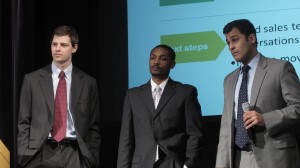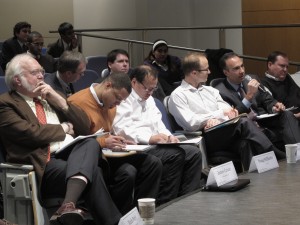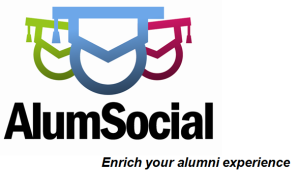On March 11th, 2011 seven teams of would-be energy entrepreneurs pitched businesses as their final presentations for NUvention Energy. The course brings together students in engineering, business, law and other graduate and undergraduate disciplines to form interdisciplinary teams that work on projects in energy innovation. These projects stem from faculty and student research at Northwestern, as well as research from Argonne National Lab, and advisory board partners, such as the Center for Neighborhood Technology and ComEd. Students pitched to a judging panel made up of industry experts, entrepreneurs, and clean tech investors. They received valuable feedback and advice on their business plans and how to move forward with their businesses. Congratulations to all the teams for a great quarter!
Projects from the Winter quarter NUvention Energy class included:
SiNode
The highest scoring team this quarter worked on lithium ion battery technology. The business, SiNode, commercializes a new silicon-based anode that combines the high capacity of silicon for Li storage with the high conductivity of graphene in a composite structure based on nanotechnology. This anode provides a 30% increase in energy density for the total battery, is low cost compared to competitors, and highly scalable. SiNode plans to license their technology to component and battery manufacturers.

Members of the winning team - SiNode
EVIDENT
Second place went to the team working on electric vehicle charging infrastructure. EVIDENT uses proprietary software analytics capabilities to identify optimal locations for electric vehicle charging stations. The company plans to sell site selection services to municipalities, electric vehicle supply equipment companies, and national retailers. Their model combines core predictive data, client and site specific requirements, and proprietary algorithms to allow customers to make informed and cost-effective decisions about EV infrastructure locations.
Urban Sustainability Scans
The Urban Sustainability Scans team will offer its clients, municipalities, the opportunity to become more environmentally sustainable, create jobs, and save money. The team, in partnership with the Center for Neighborhood Technology, will perform a scan on a municipality for a fee, using public data and proprietary models. The scan focuses on key areas of environmental concern, such as transportation, buildings and land use. The final product will be a report detailing opportunities for areas of improvement with a quick ROI, a plan for implementation, and opportunities for grants, subsidies, or additional sources of revenue.
Materials Nexus
The computational materials innovation team focused on encouraging the commercialization of new materials key to clean technologies. They propose to do this by providing a platform that would reduce the time necessary for research and development of these materials. Their company, Materials Nexus, aggregates and organizes valuable data from academic collaborators while providing an interface between researchers and industry, accelerating the pace at which vital new technologies can be developed. For a fee, users have access to the database, which provides powerful search, visualization, and data mining tools, enabling users to easily find materials that meet their needs.
Model-T Solar
The solar team worked on developing thin film solar modules that provide the highest return on investment for utility-scale solar developers. They partnered with Argonne National Laboratory, who pioneered their technology. The company, Model-T Solar, boasts solar technology that includes improved efficiency, low cost due to the use of widely available raw materials, and ease of scalability.

The judging panel asking questions during a team presentation
RUN GREENER
This team focused on creating a system to motivate people to reduce energy consumption and develop more energy efficient behaviors. Their business, RUN GREENER, is a year-long reward system that allows users to earn points through engaging in energy efficient behavior. Users participate through a contest website and can redeem their points for attractive prizes provided by partner companies. RUN GREENER plans to contract with energy utilities, providing them with a program to reduce energy consumption, encourage behavior change, and ease the mounting burden on the grid.
SmartBridge
This team worked on a project to drive behavior change in the way people interact with smart grid technology. SmartBridge is a social gaming platform that allows users to take full advantage of smart grid technology by encouraging them to use energy more efficiently. Customers will be able to compare their utility usage with friends and family, track their energy use and carbon footprint, receive energy saving tips, and then redeem their energy savings for reward points, which can be used purchase products from partner companies.







